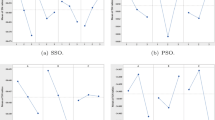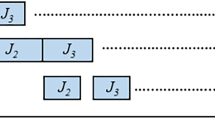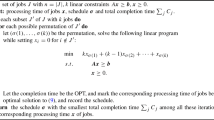Abstract
We study ordinal makespan scheduling on small numbers of identical machines, with respect to two parallel solutions. In ordinal scheduling, it is known that jobs are sorted by non-increasing sizes, but the specific sizes are not known in advance. For problems with two parallel solutions, it is required to design two solutions, and the performance of an algorithm is tested for each input using the best solution of the two. We find tight results for makespan minimization on two and three machines, and algorithms that have strictly better competitive ratios than the best possible algorithm with a single solution also for four and five machines. To prove upper bounds, we use a new approach of considering pairs of machines from the two solutions.


Similar content being viewed by others
Data availability
Data sharing is not applicable to this article, as no data sets were generated or analysed during the current study.
Code availability
There is no software for this work.
References
Albers S, Hellwig M (2017) Online makespan minimization with parallel schedules. Algorithmica 78(2):492–520
Angelopoulos S, Dürr C, Kamali S, Renault MP, Rosén A (2018) Online bin packing with advice of small size. Theory Comput Syst 62(8):2006–2034
Böckenhauer H, Komm D, Královic R, Královic R, Mömke T (2017) Online algorithms with advice: the tape model. Inf Comput 254:59–83
Boyar J, Kamali S, Larsen KS, López-Ortiz A (2016) Online bin packing with advice. Algorithmica 74(1):507–527
Boyar J, Favrholdt LM, Kudahl C, Mikkelsen JW (2018) Weighted online problems with advice. Theory Comput Syst 62(6):1443–1469
Cheng TCE, Kellerer H, Kotov V (2012) Algorithms better than LPT for semi-online scheduling with decreasing processing times. Oper Res Lett 40(5):349–352
Dohrau J (2015) Online makespan scheduling with sublinear advice. In: Proceedings of the 41st international conference on current trends in theory and practice of computer science (SOFSEM’15), pp 177–188
Epstein L (2023) Parallel solutions for preemptive makespan scheduling on two identical machines. J Sched 26(1):61–76
Epstein L, Lassota A, Levin A, Maack M, Rohwedder L (2022) Cardinality constrained scheduling in online models. In: Proceedings of the 39th international symposium on theoretical aspects of computer science (STACS’22), pp 28:1–28:15
Fekete SP, Grosse-Holz J, Keldenich P, Schmidt A (2023) Parallel online algorithms for the bin packing problem. Algorithmica 85(1):296–323
Graham RL (1969) Bounds on multiprocessing timing anomalies. SIAM J Appl Math 17(2):416–429
He Y (2001) Semi-on-line scheduling problems for maximizing the minimum machine completion time. Acta Math Appl Sin 17(1):107–113
He Y, Tan Z (2002) Ordinal on-line scheduling for maximizing the minimum machine completion time. J Comb Optim 6(2):199–206
Ji S, Li R, Zhou Y (2017) Ordinal semi on-line scheduling for jobs with arbitrary release times on identical parallel machines. Intell Inf Manag 9(6):245–254
Kellerer H, Kotov V, Speranza MG, Zs Tuza (1997) Semi on-line algorithms for the partition problem. Oper Res Lett 21(5):235–242
Liu W-P, Sidney JB (1996a) Bin packing using semi-ordinal data. Oper Res Lett 19(3):101–104
Liu W-P, Sidney JB (1996b) Ordinal algorithms for packing with target center of gravity. Order 13(1):17–31
Liu W, Sidney JB, van Vliet A (1996) Ordinal algorithms for parallel machine scheduling. Oper Res Lett 18(5):223–232
Mahadev NVR, Pekeč A, Roberts FS (1998) On the meaningfulness of optimal solutions to scheduling problems: can an optimal solution be nonoptimal? Oper Res 46(S–3):S120–S134
Mikkelsen JW (2016) Randomization can be as helpful as a glimpse of the future in online computation. In: Proceedings of the 43rd international colloquium on automata, languages, and programming, (ICALP’16), pp 39:1–39:14
Renault MP, Rosén A, van Stee R (2015) Online algorithms with advice for bin packing and scheduling problems. Theor Comput Sci 600:155–170
Seiden SS, Sgall J, Woeginger GJ (2000) Semi-online scheduling with decreasing job sizes. Oper Res Lett 27(5):215–221
Tan Z, He Y (2001) Semi-on-line scheduling with ordinal data on two uniform machines. Oper Res Lett 28(5):221–231
Tan Z, He Y (2002) Ordinal algorithms for parallel machine scheduling with nonsimultaneous machine available times. Comput Math Appl 43(12):1521–1528
Tan Z, He Y (2004) Ordinal scheduling problem and its asymptotically optimal algorithms on parallel machine system. Sci China Ser F Inf Sci 47(2):161–169
Tan Z, He Y, Epstein L (2005) Optimal on-line algorithms for the uniform machine scheduling problem with ordinal data. Inf Comput 196(1):57–70
Wang L, Li R, Zhou Y (2019) Better algorithm of ordinal online schedule for jobs with similar sizes on two machines. Am J Oper Res 9(5):235–243
Funding
The author declares that no funds, grants, or other support were received during the preparation of this manuscript.
Author information
Authors and Affiliations
Corresponding author
Ethics declarations
Conflict of interest
There are no conflicts of interest or competing interests for this work.
Additional information
Publisher's Note
Springer Nature remains neutral with regard to jurisdictional claims in published maps and institutional affiliations.
Rights and permissions
Springer Nature or its licensor (e.g. a society or other partner) holds exclusive rights to this article under a publishing agreement with the author(s) or other rightsholder(s); author self-archiving of the accepted manuscript version of this article is solely governed by the terms of such publishing agreement and applicable law.
About this article
Cite this article
Epstein, L. Parallel solutions for ordinal scheduling with a small number of machines. J Comb Optim 46, 3 (2023). https://doi.org/10.1007/s10878-023-01069-8
Accepted:
Published:
DOI: https://doi.org/10.1007/s10878-023-01069-8




